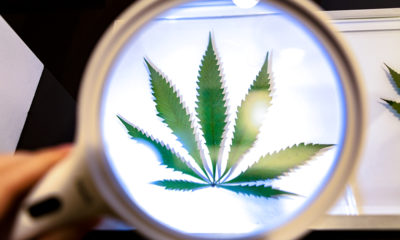
Medical
Whole Plant Medical Cannabis Fight Heats Up in Utah Again
If SB 73 is signed into law, Utah will become the 24th medical cannabis state in the nation and the first to progress to a whole plant legislation from CBD-only.
Last year, Utah State Sen. Mark Benson Madsen shocked the state and national media when, in the middle of Utah’s short 45-day legislative session, he announced the state’s first whole-plant medical cannabis bill and declared he is also a patient who had recently used legally in neighboring Colorado.
The bill, SB 259, was narrowly defeated in a surprise flipped vote in the senate, inciting a growing body of patients to come forward and declare both their use and support for safe legal access in the notoriously conservative state, where support among conservatives, Mormons and Republicans tops 65 percent.
Recent headlines out of Utah have featured the stories of patients suffering from rare muscular and neurological disorders, cancers and autoimmune diseases. As more patients went public, more came forward to support Sen. Madsen’s bill. Until last week all were safe from legal prosecution for choosing to come forward and support its passage.
On Monday, Utah Department of Child and Family Services (DCFS) arrived at the Nephi, Utah home of Sarah Ellet and her daughter, 3-year-old Remie, after reports she had been illegally dosing her daughter with small amounts of cannabis oil to treat her multiple damaging conditions. A week earlier, their story garnered national media attention, seemingly prompting the investigation. The Ellets fled Utah mid-week for the safety of Oregon, where they are legally registered state patients.
“Families are being torn apart, whether through incarceration, DCFS investigation, or being forced to leave the state as medical refugees,” says Connor Boyack, president and founder of The Libertas Institute. “Utah’s pro-family history stands at odds with its un-compassionate, anti-cannabis policy. It’s time for that to change.”
The Libertas Institute is a Utah-based libertarian think-tank. In 2014, Boyack was essential in introducing the medical cannabis issue to the forefront of conservative-state politics by helping bring about HB 105, the nation’s first CBD-only law. Eleven more conservative states followed and CBD-only medical cannabis soon founds its way into more states.
After the first airing of CNN’s groundbreaking “Weed” documentary, which featured the story of pediatric epileptic patients using high-CBD cannabis oil in Colorado, Boyack supported patients and patient advocates with epilepsy organizations to facilitate passage of a law to bring about safe access to the medicine. In March 2014, Utah became the first state to pass a “CBD-only” medical cannabis law. The law, dubbed Charlee’s Law, was named after 6-year-old Charlee Nelson, who passed away while awaiting the bill’s passage. The law is set to expire, or “sunset”, this summer.
Under HB 105, patients with intractable epilepsy can register with the state Hemp Extracts Registry, which allows them to possess extracts high enough in CBD and low enough in THC to arbitrarily be classified as hemp. There is no legal method for production and distribution in the state, so patients must break federal law to obtain the medicines across state lines. Further, lab results indicating CBD/THC content must be filed for every batch of medicine with the state department of heath, in person in Salt Lake City.
Libertas is now heading the efforts for the passage of SB 73, Sen. Madsen’s Medical Cannabis Act. If passed into law, SB 73 would establish in-state cultivation, dispensaries, production and would expand the list of qualifying conditions to include AIDS, cancer, autoimmune disorders, PTSD, pain and other common conditions cannabis has been proven to benefit. Home gardens would still remain illegal and, although whole-plant cannabis flowers will be accessible to patients, smoking is outlawed in favor of vaporization.
Utah has just a 45-day legislative session, which began January 25. SB 73 will first be heard in the Senate Judiciary Committee, before going to the senate floor. Once it passes three hearings in the senate, it moves on to the House of Representatives. If passed, it will be signed into law March 11 by Governor Gary Herbert and go into effect this summer.
Opposition senators, who opposed Sen. Madsen’s whole-plant legislation last year, have introduced a competing bill that would slightly expand the current CBD legislation for more patients. There is no public patient support for the legislation.
If SB 73 is signed into law, Utah will become the 24th medical cannabis state in the nation and the first to progress to a whole plant legislation from CBD-only.
What do you think? Will Utah take the leap and progress into providing whole plant medicine?
























